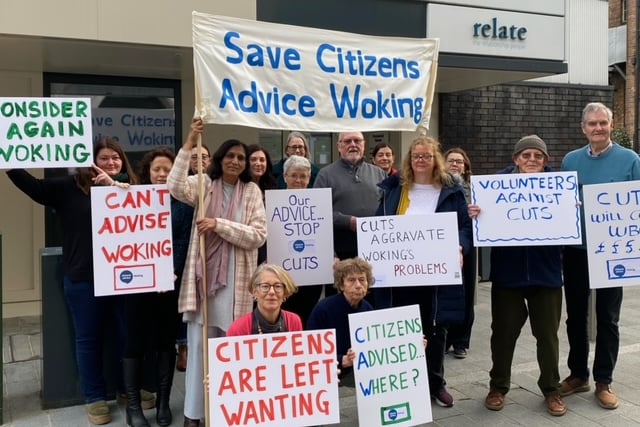Crowds gathered at the Civic Offices last Thursday (February 8, 2024) to protest against Woking Borough Council’s funding cuts to Citizens Advice Woking (CAW) and, later, to observe from the public gallery the council meeting which would confirm the cuts.
Woking MP Jonathan Lord said: “I was pleased to join the many volunteers of Citizens Advice Woking in their protest. I am as bitterly disappointed as the volunteers at Woking council’s decision to remove the core grant funding from Citizens Advice Woking. I still do not know how the council will manage to replace these vital services if Citizens Advice Woking is not able to provide the same level of help and support as in the past.”
During the meeting, councillors agreed an additional package of support for CAW which, the council said, will assist them in finding alternative financial streams and transition from council funding.
The council further noted that, in addition to £179,000 financial and in-kind support, it is offering a further £50,000 to CAW to recruit a hardship coordinator on a 12-month contract, bringing the total support package to £229,000 for 2024-25.
However, the group of volunteers who have been prominent in opposing the cuts were unconvinced by the council’s figures, and nor do they feel that real impact of the cuts has yet been grasped. Two of them, Ellie George and Kay Riley, were sufficiently concerned to write to the News & Mail.
“We have seen large numbers being shared of the excellent funding that has been secured for Citizens Advice Woking to continue its service,” they wrote. “Many of our supporters are congratulating us on succeeding in our campaign to save our service.
“Now here comes the but...We would love to continue our service, but the financial funding is not actually there for us to do so. The new numbers being quoted certainly look good on paper.
“However, the money is caught up in various ways: 50 per cent of the money granted to CAW relates to the office accommodation, a notional rent and service charges which the council as landlord will keep; 28 per cent is allocated to ring-fenced projects that cannot be used for operational costs – the majority of this money is actually provided by the government, not the council.
“Then the 22 per cent of ‘new’ funding. It is not clear if this will also be ring-fenced to perform additional duties. If the ‘new’ funding is available for CAW to deliver its core activities, a best case, then our operational funding is about a quarter of last year.
“What this means in terms of our service is still being determined but it is clear that it will, at a minimum, need to be reduced. While we volunteers are helping the management with more fundraising opportunities and remain hopeful that we can access some external grants, we expect that we will face stiff competition wherever we seek help.
“As volunteers we will continue to express concern at the way the council is removing funding from CAW – and we see no evidence that the proposed council efficiencies can be in place by April 1 to cope with increased demand.
“We will be very sad if CAW has to redirect our vulnerable residents to the council knowing that, through no fault of their own, the staff at the council are unable to help.”


.jpeg?width=209&height=140&crop=209:145,smart&quality=75)


Comments
This article has no comments yet. Be the first to leave a comment.